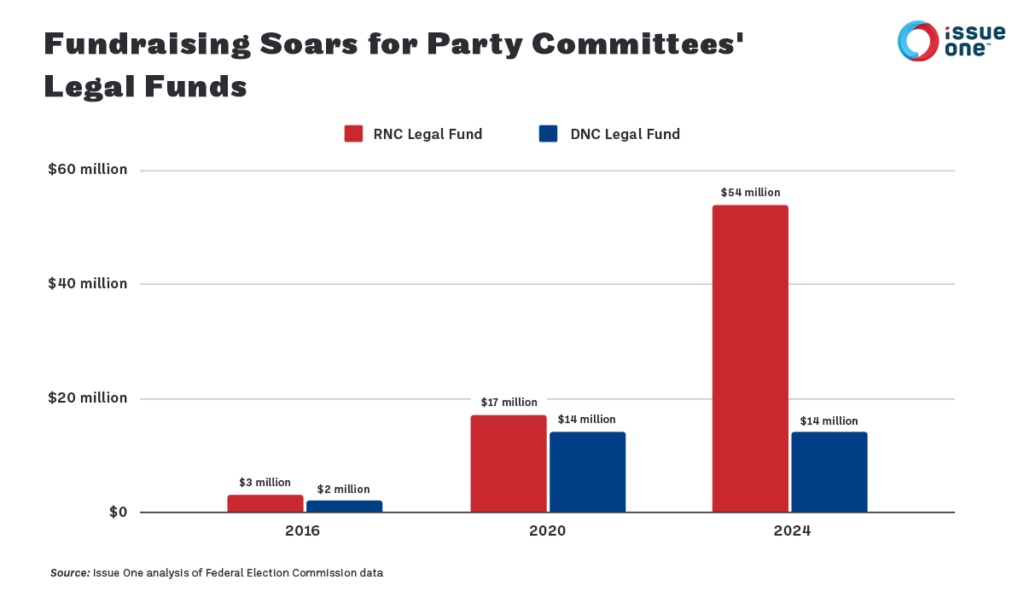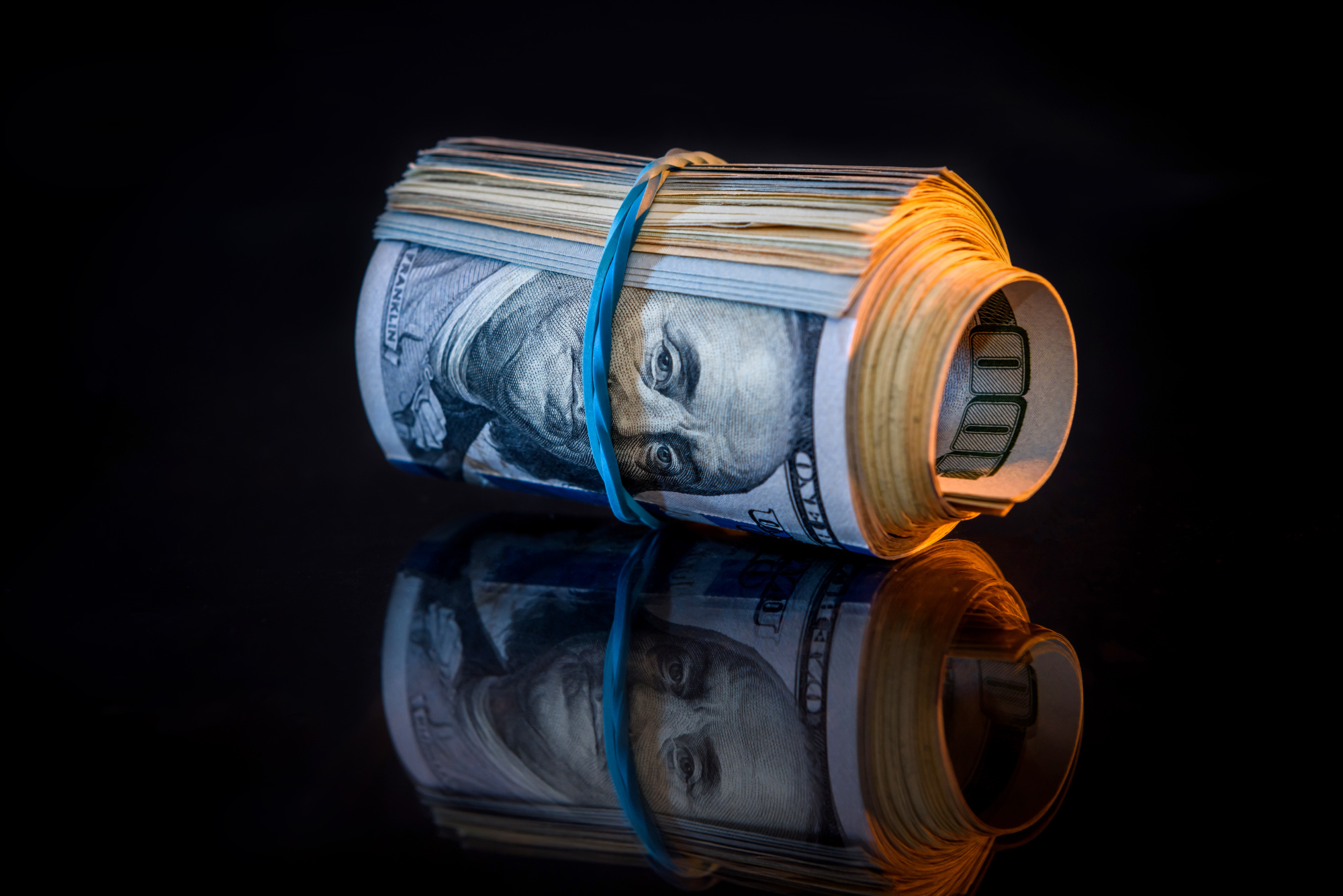Even before the results of the presidential election are tabulated, partisan actors are busy behind the scenes filing lawsuits seeking clarification about existing election rules and, in the most extreme cases, taking aim at the processes governing which ballots are counted and even how ballots are counted.
Much of this barrage of lawsuits is coming from groups aligned with former President Donald Trump, including the Republican National Committee (RNC), which is already active in more than 130 cases — though critics say many of these lawsuits are based on “unreliable data” and “shoddy methodology.”
One RNC-litigated case has challenged the validity of ballots that are mailed before Election Day but arrive with election officials in the days after, something that is currently allowed in 18 states plus Washington, D.C. Others have challenged the validity of ballots from overseas voters who are U.S. citizens. While still others have charged that election officials haven’t taken aggressive enough actions to ensure that noncitizens do not illegally cast votes in this year’s election.
For the past decade, both the RNC and its Democratic Party counterpart — the Democratic National Committee (DNC) — have been allowed to collect large contributions from donors earmarked to support the parties’ election-related legal fights. But this year, the RNC appears to be more aggressively courting donors to support its legal battles.
A new Issue One review of federal campaign finance data shows the RNC’s legal fund has raised nearly four times as much money as the DNC’s legal fund — $54 million versus $14 million through Oct. 16, the date of the most recent campaign finance reports.

In fact, the RNC legal fund sums are up $37 million (or more than 200%) compared to 2020, and up about $51 million (or about 1,700%) compared to 2016. And while the DNC’s legal fund sums are up about $12 million (or about 600%) from 2016, they are actually roughly the same as 2020.
Who’s underwriting these efforts? Issue One’s analysis shows that ultra-wealthy Americans, including at least 50 billionaires, are among those helping fund the parties’ legal battles, including more than three dozen billionaires who have given to the RNC’s efforts and a dozen who have supported the DNC’s.
“It’s alarming that our broken campaign finance system allows wealthy Americans and special interests to ingratiate themselves with political leaders while funding lawsuits that erode people’s confidence in the integrity of our elections,” said Issue One founder and CEO Nick Penniman. “When billionaires bankroll an avalanche of lawsuits designed to question the integrity of our elections, they aren’t just pouring money into politics, they’re chipping away at the very foundation of democracy.”
Penniman continued: “Much of the relentless flood of litigation is aimed at undermining confidence in the system for political gains, sowing seeds of distrust that could take years to repair. We should be fostering a unified commitment to fair, transparent elections — not allowing big money to fuel division and doubt. America’s future depends on putting the American people above politics.”
Who’s funding the RNC’s legal fund?
This year alone, more than 200 wealthy Americans have given the legal maximum of $123,900 to the RNC’s legal fund, according to an Issue One analysis of federal campaign finance data.
This includes 13 people who gave the legal maximum in both 2023 and 2024, for a total of $247,800 over two years.
These 13 megadonors are:
- Scott Bessent, a hedge fund executive often mentioned as a possible Treasury Secretary if Trump wins a second term in the White House.
- Ron Cameron, the owner and chairman of Mountaire Corporation, one of the country’s largest chicken farming companies.
- Katharyn S. Cook, a retiree who lives in Las Vegas, Nevada.
- Saul Fox, the founder and CEO of Fox Paine & Company, a private equity firm.
- Edward Glazer, the billionaire co-owner of the Tampa Bay Buccaneers professional football team and co-owner of the Manchester United professional soccer team in the United Kingdom.
- Diane Hendricks, the billionaire co-founder and chairman of ABC Supply, one of the largest wholesale distributors of roofing, siding, and windows in the United States, and richest woman in Wisconsin.
- Nancy Hiles, the wife of Marcus Hiles, the chairman and CEO of Texas-based Western Rim Property Services and Mansions Custom Homes, which own or manage more than 10,000 townhouses, apartments, and homeowner associations.
- Howard Lutnick, a wealthy businessman who is a co-chair of Trump’s 2025 transition team.
- Marlene Ricketts, wife of billionaire Joe Ricketts, the founder, former CEO, and former chairman of financial services firm TD Ameritrade, and matriarch of the family that owns the Chicago Cubs professional baseball team.
- Charles Schwab, the billionaire founder and chairman of the Charles Schwab Corporation, the financial services company.
- Warren Stephens, the billionaire chairman, president, and CEO of the Arkansas-based financial services company Stephens Inc.
- Elizabeth Uihlein, the billionaire co-founder of the shipping supplies company Uline with her husband Richard Uihlein.
- Steve Wynn, the billionaire casino mogul and a former chairman of the RNC, who resigned in 2018 amid sexual misconduct allegations.
Other notable donors who have, since January 2023, given at least $123,900 — i.e., the equivalent of the legal maximum contribution in a single year — include:
- Miriam Adelson, the billionaire widow of casino mogul Sheldon Adelson.
- Brian Ballard, a lobbyist and elite Trump campaign fundraiser, who Politico once called “the most powerful lobbyist in Trump’s Washington.”
- Jimmy John Liautaud, the billionaire founder of sandwich chain Jimmy John’s.
- Charles Kushner, the real estate developer and father of Trump’s son-in-law Jared Kushner who was pardoned by Trump in December 2020 for his previous convictions on charges of tax evasion, retaliating against a witness, and lying to the Federal Election Commission.
- Jared Kushner, Trump’s son-in-law who also served a senior advisor to Trump during his time in the White House.
- Kelly Loeffler, a former senator from Georgia and wife of billionaire Jeffrey Sprecher, the founder, chairman, and CEO of Intercontinental Exchange, which owns the New York Stock Exchange.
- Bernard Marcus, the billionaire co-founder and former CEO of Home Depot.
- Linda McMahon, the co-founder and former CEO of World Wrestling Entertainment who is married to billionaire Vince McMahon and who served in Trump’s Cabinet as the administrator of the Small Business Administration and is now a co-chair of Trump’s 2025 transition team.
- Henry Ross Perot Jr., the billionaire founder and chairman of the real estate development company Hillwood and son of former Reform Party presidential candidate Ross Perot, who twice ran for president in the 1990s.
- Amanda Schumacher, the founder and president of Tree of Life Foundation International, a charity based in West Palm Beach, Florida, that has, in recent years, contributed to Trump-aligned organizations including the America First Legal Foundation, the America First Policy Institute, and the Conservative Partnership Institute.
- Paul Singer, the billionaire founder, president, and co-CEO of hedge fund Elliott Investment Management.
- Dan Snyder, the billionaire former owner of the Washington Commanders professional football team.
- Jeffrey Sprecher, the billionaire founder, chairman, and CEO of Intercontinental Exchange, which owns the New York Stock Exchange, and husband of former Sen. Kelly Loeffler (R-GA).
- Dana White, the head of mixed martial arts promotion company Ultimate Fighting Championship (UFC).
Additionally, at least six of Trump’s former ambassadors have also donated at least $123,900 since January 2023 to the RNC’s legal fund, including:
- David Fischer, the former ambassador to Morocco,
- George Glass, the former ambassador to Portugal,
- Jamie McCourt, the former ambassador to France and Monaco,
- John Rakolta, the former ambassador to the United Arab Emirates,
- Trevor Traina, the former ambassador to Austria, and
- Robert Wood “Woody” Johnson IV, the billionaire former ambassador to the United Kingdom and co-owner of the New York Jets professional football team.
The RNC’s legal fund has also received contributions from the leadership PACs of a dozen GOP lawmakers, including Rep. Elise Stefanik (R-NY) and Sens. Rick Scott (R-FL), Tim Scott (R-SC), Marco Rubio (R-FL), and JD Vance (R-OH), who is now Trump’s vice presidential running mate.
Of these PACs, Rick Scott’s gave the most, at $90,000. Vance’s gave $30,000. The others each gave $45,000.
Meanwhile, the National Republican Senatorial Committee (NRSC) has contributed $2.7 million to the RNC’s legal fund since January 2023, including $1 million last month, and the National Republican Congressional Committee (NRCC) has contributed $6 million since January 2023, including nearly $2.3 million since the start of September.
Who’s funding the DNC’s legal fund?
This year, only about 30 individuals have given the legal maximum to the DNC’s legal fund, according to Issue One’s analysis of federal campaign finance data.
And unlike the RNC’s legal fund, the DNC’s legal fund does not have any donors who have given the legal maximum in both 2023 and 2024, despite the fact that a dozen billionaires have contributed since January 2023.
Some of the notable donors who have, since January 2023, given at least $123,900 — i.e., the equivalent of the legal maximum contribution in a single year — are:
- David Ellison, the founder and CEO of entertainment company Skydance Media and the son of billionaire Larry Ellison, who co-founded the software company Oracle.
- Fred Eychaner, the head of Chicago-based Newsweb Corp., a business that specializes in printing community, college, and ethnic newspapers.
- Gordon Getty, the billionaire businessman and classical music composer who is the son of oil tycoon J. Paul Getty.
- Avram Glazer, billionaire co-owner of the Tampa Bay Buccaneers professional football team and co-owner of the Manchester United professional soccer team in the United Kingdom.
- Reid Hoffman, the billionaire venture capitalist who is the co-founder and executive chairman of social media platform LinkedIn and the co-founder of an artificial intelligence start-up known as Inflection.
- Seth MacFarlane, the actor, producer, and director known for TV series including Family Guy, American Dad!, and The Cleveland Show, and films including Ted, Ted 2, and A Million Ways to Die in the West.
- George Marcus, the billionaire real estate broker who is the chairman of Marcus & Millichap, a publicly-traded real estate brokerage he founded in 1971.
- Dustin Moskovitz, the billionaire co-founder of social media giant Facebook and software company Asana, where he continues to serve as the CEO.
- Michael Novogratz, the billionaire CEO of cryptocurrency investment firm Galaxy Investment Partners.
- Mark Pincus, the billionaire former CEO of video game company Zynga, who endorsed Trump in a tweet on Sunday night.
- Cheryl Saban, a psychologist, author, and television writer who is the wife of billionaire media mogul Haim Saban, who created the Power Rangers franchise.
- Christopher Sacca, a wealthy venture capitalist who occasionally appeared as a “guest shark” on ABC’s Shark Tank between 2015 and 2020.
- Eric Schmidt, the billionaire former CEO and former executive chairman of Google.
- Paul Sciarra, the billionaire co-founder of social media platform Pinterest.
- George Soros, the billionaire hedge fund manager and philanthropist who earned the nickname “the man who broke the Bank of England” after shorting the British pound in 1992.
- Steven Spielberg, the billionaire Hollywood director known for hits including Jaws, E.T., Jurassic Park, Schindler’s List, and Saving Private Ryan.
The DNC’s legal fund also counts among its donors the PACs of several labor unions, including AFSCME, the American Federation of Teachers, the International Association of Fire Fighters, the International Brotherhood of Electrical Workers, the United Auto Workers, and the United Steelworkers.
The sole Democratic lawmaker whose leadership PAC has earmarked money to the DNC’s legal fund is former House Speaker Nancy Pelosi (D-CA), whose PAC has given $45,000.







